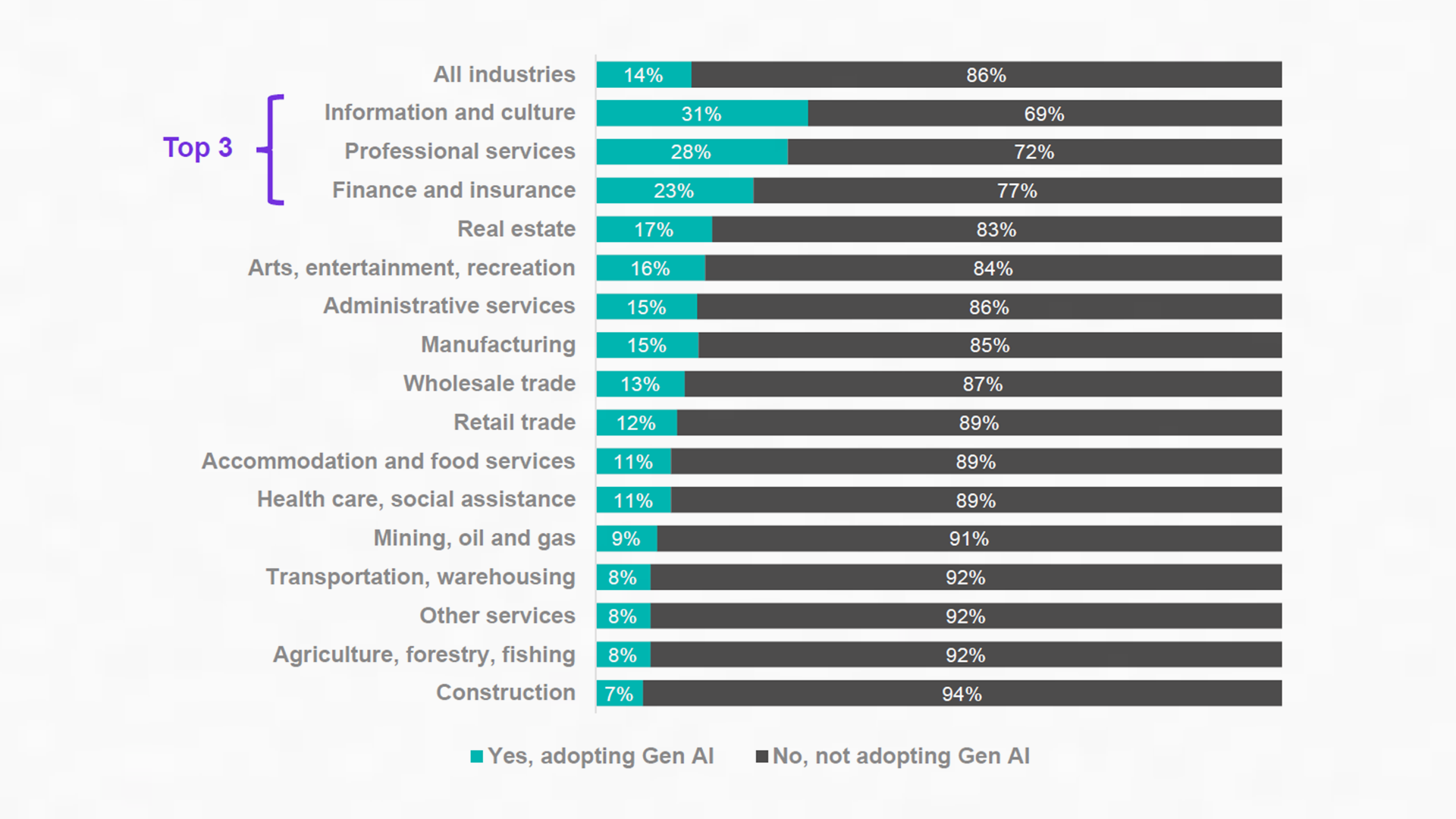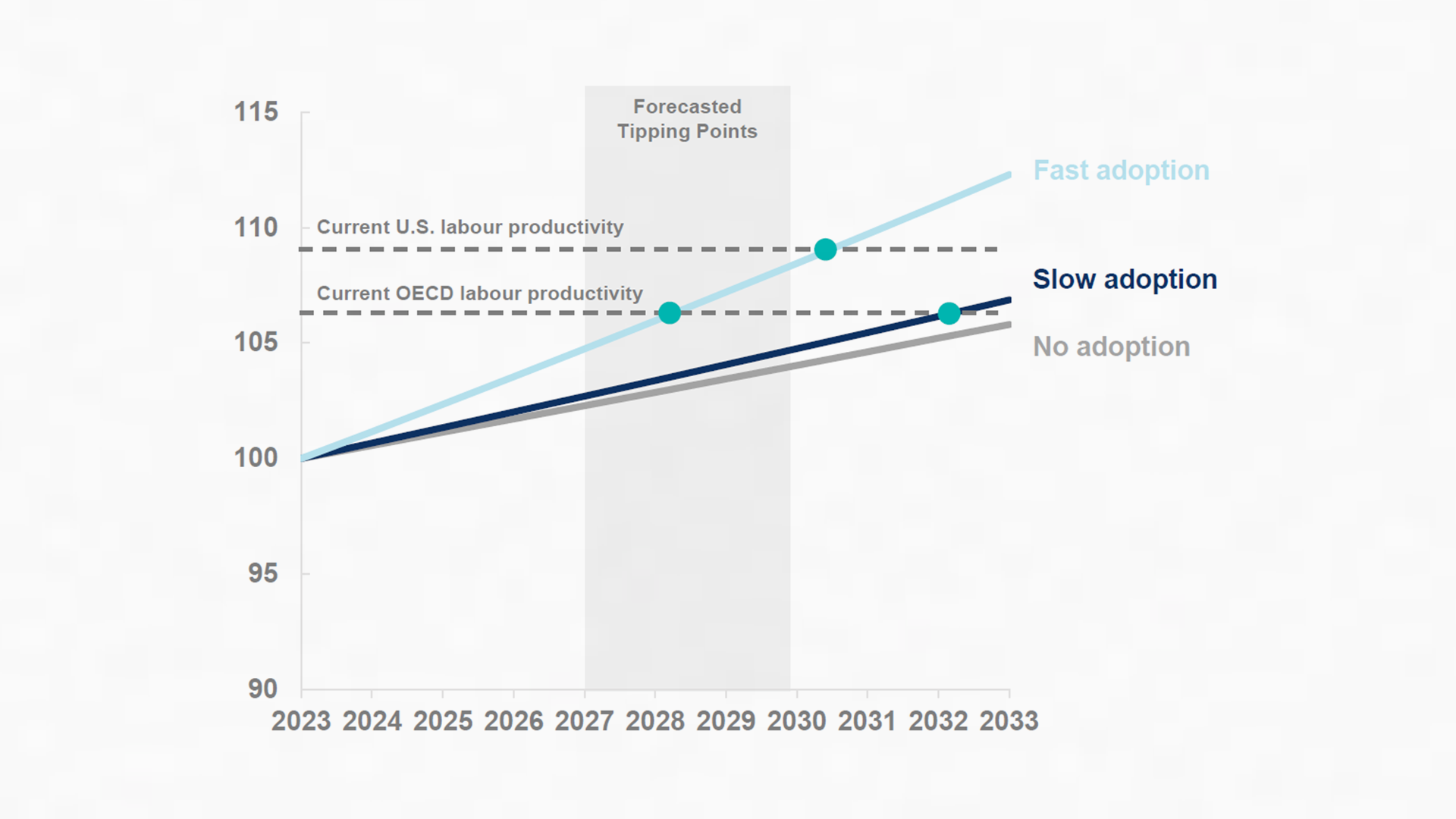Blog /
Prompting Productivity: Generative AI Adoption by Canadian Businesses
This report is a deep dive look of Generative AI adoption by Canadian businesses.

Canada’s declining productivity and standard of living have been called an “emergency” situation by the Bank of Canada.
Generative artificial intelligence (Gen AI) represents a generational opportunity to prompt productivity by helping Canadian businesses, and their workers, accelerate the production and quality of their goods and services. So why are 73% of businesses yet to consider integrating this transformative technology into their operations?
Let’s find out by exploring the highlights of our latest report, Prompting Productivity: Generative AI Adoption by Canadian Businesses.



Canada’s Productivity Problem
Labour productivity is the amount of gross domestic product (GDP) created per hour worked. The more GDP per hour, the higher the country’s productivity.
Canada’s productivity not only lags behind many peer economies but has recently been in decline. It wasn’t always like this. In 2000, Canada’s productivity was higher than the OECD average. Yet, in the past decade, Canada’s productivity has only increased by 0.9% annually.
Labour productivity
GDP per hour worked, with international counterparts

Notes: Index (2007 = 100). Constant US 2015 PPP dollars. Shaded areas are recessions.
What’s going on? Canada’s stagnant productivity is a result of:
- Weak competition within sectors.
- Poor use of Canada’s highly skilled workforce.
- A larger share of small and less productive businesses.
- Low levels of businesses investment in machinery and equipment and research and development.
Standard of living
GDP per capita, with international counterparts

Notes: Index (2007Q1 = 100). Shaded areas are recessions.
The Connection Between Productivity and Standard of Living
GDP per capita is a common measure of a country’s standard of living. While not perfect, it is a simple way of comparing the material prosperity of different countries.
Low productivity means that workers are not producing goods and services efficiently, leading to lower wages, less tax revenue for public services and potentially fewer future jobs.
Read the Canadian Chamber’s Policy Matters on productivity to learn more.

Business’s Early Adopters
Gen AI is poised to be a catalyst of positive change and productivity growth, and its increasing accessibility and applications leave little excuse for Canadian businesses to sit on the sidelines. Fortunately, some aren’t. Around 1 in 7 businesses (14%) are early Gen AI adopters.
Use of Gen AI in Canada in 2024
% of businesses, by all industries

Business size, age, industry and international trade status are key determinants in Gen AI adoption:

Larger businesses (100+ employees) are nearly twice as likely to adopt Gen AI as small businesses (1 to 99 employees).

One in five emerging enterprises (10 years of operations or less) are adopting Gen AI compared to 1 in 10 mature enterprises.

Businesses in the information and cultural industry are leading the way in Gen AI adoption at 31%, followed by the professional services (28%) and finance and insurance (23%) industries.

Goods and service exporters are early adopters of AI at 24% and 48% respectively.
Use of Gen AI in Canada in 2024
% of businesses by employment size that are “already using” and “plan to use”

Use of Gen AI in Canada in 2024
% of businesses by age that are “already using” and “plan to use”

Use of Gen AI in Canada in 2024
% of businesses by industry that are “already using” and “plan to use”

Use of Gen AI in Canada in 2024
% of businesses by international activity that are “already using” and “plan to use”

Source: Business Data Lab analysis based on Statistics Canada’s Canadian Survey on Business Conditions; 13,327 business responses in January and February 2024.

The Business Value of Gen AI
Of the 14% of Canadians businesses that are already using or plan to use Gen AI, the dominant reason for doing so is not to replace workers, but to accelerate development of creative content (69%) and to increase automation in tasks without reducing employees (46%).
Interestingly, and probably comfortingly for today’s workers, only 13% of business using Gen AI specifically value it for automating tasks to replace employees.
Perceived business value created by Gen AI in 2024
% of businesses that affirmed they are “already using” or “plan to use” Gen AI, by industry


Reaching the Tipping Point
Based on two adoption scenarios, “slow” and “fast”, we project that Gen AI by Canadian businesses will reach a tipping point of 50% adoption in three to six years. This may seem soon, but it’s probably not soon enough to keep pace with global leaders, like the United States and China.
According to Google Trends, the world is more interested in AI than Canada. Not only that, but consecutive global IPSOS surveys found that Canadians were less knowledgeable and more nervous about AI than citizens in most other countries.
Projected Gen AI adoption rates by businesses in Canada

Notes: Fast Scenario P(t)=1/(1+exp(-0.62(t-2.92))); Slow Scenario P(t)=1/1+exp(-0.40(t-5.69)))
Historically, first mover advantage is incredibly important in technology adoption. Early adopters often gain a competitive edge over rivals by introducing superior products and services, securing resources and setting industry standards. From a business perspective, Microsoft says the average return on investment is $3.50 for every $1 invested in AI.
Depending on the pace of adoption, over the next 10 years, Gen AI could boost Canada’s productivity between 1-6%.
Projected labour productivity for Canada using Gen AI (2023–2033)
GDP per hour worked under a “fast” and “slow” Gen AI adoption scenario

Notes: Productivity was forecasted using a 5-year compound average annual growth rate (2017–2022). A slow adoption scenario assumes an average annual growth in productivity of 0.1%, and a fast adoption scenario assumes 0.6% annually. These are based on global adoption and productivity gains.

Barriers to Gen AI Adoption
Considering the potential ROI for businesses plus the long-term economic benefits of Gen AI, what’s keeping more Canadian businesses from adopting Gen AI? Over a third of businesses (35%) say hiring workers with tech skills, closely followed by accessing financial resources to invest in new tech (33%).
Challenges to adopting new technologies
% of businesses that answered “somewhat challenging” and “extremely challenging”

When it comes to adopting or incorporating new technologies:
- Small businesses have a less challenging time with reorienting their business strategy/processes, retraining employees, or integrating new technologies into their existing technology infrastructure than larger businesses.
- Small businesses have a more challenging time with accessing financial resources to investment in new technologies than larger businesses.

Recommendations for Business and Government
With Gen AI’s potential to prompt productivity growth, ultimately benefiting all Canadians, it’s critical that businesses and policymakers collaborate together on accelerating wider adoption.
It’s critical Canadian businesses experiment with Gen AI. Businesses can start with small-scale pilot projects to validate the feasibility and impact of Gen AI before gradually expanding to larger initiatives based on successful proofs of concept.
Our top recommendation for government is to lead by example and take advantage of the benefits of Gen AI. Government can also help address the challenges businesses face in adopting Gen AI by investing in programs that will upskill workers across the public and private sectors, and by providing necessary tools, resources and financial support for small- and medium-sized enterprises.
For the complete list of recommendations for business and policymakers:















